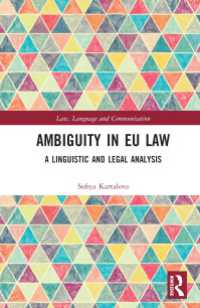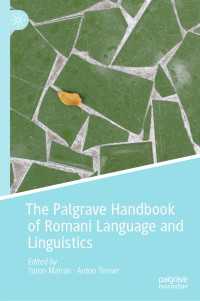- ホーム
- > 電子洋書
Description
This book explores South Korean responses to the architecture of the Japanese colonial occupation of Korea and the ways that architecture illustrates the relationship between difficult heritage and the formation of national identity. Detailing the specific case of Seoul, Hyun Kyung Lee investigates how buildings are selectively destroyed, preserved, or reconstructed in order to either establish or challenge the cultural identity of places as new political orders are developed. In addition, she illuminates the Korean traditional concept of feng shui as a core indigenous framework for understanding the relationship between space and power, as it is associated with nation-building processes and heritagization.
By providing a detailed study of a case little known outside of East Asia, ‘Difficult Heritage’ in Nation Building will expand the framework of Western-centered heritage research by introducing novel Asian perspectives.Table of Contents
1. The Problematic past and Difficult Heritage: The Japanese Colonial Occupation of Korea and Its Architectural Legacies.- 2. Mapping the Memories of the JCO.- 3. Seodaemun Prison: From Symbol of Fear and Violence to Symbol of Freedom and Victory.- 4. Gyeongbokgung Palace and the Japanese Government-General Building (JGGB): Power Struggles and the Contested Places of Korean National Identity.- 5. Dongdaemun Stadium: Between Korean Tradition, Colonial Memory, and Dreams for the Future.- 6. South Korean Responses to Japanese Colonial Occupation Architecture (JCOA).- Conclusion: The role of Difficult Heritage in Nation-Building in South Korea.
-

- 洋書電子書籍
- 非言語性学習障害児の理解:科学と実践の…
-

- 洋書電子書籍
- EU法の文言の曖昧性:言語学・法学的分…
-

- 洋書電子書籍
-
ロマ語ハンドブック
The Pa…
-
- 洋書
- Fatherless
-

- 洋書電子書籍
- Braking of Road Veh…




